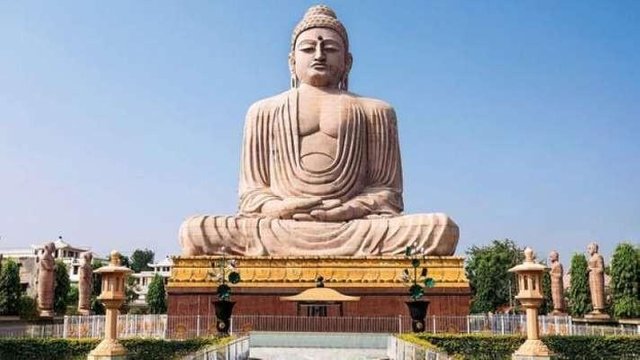Mahabodhi Temple is one of the ancient and most important shrines of India. Located at Bodhgaya, Mahabodhi Mahavihara Temple is easily accessible from the major towns and cities of Bihar. The nearest airport is located at Patna that lies at a distance of 96 kms from Gaya. The holy town Bodh Gaya or Gaya has its own railway station. The town is also connected with major cities by network of roads. The literal version of Mahabodhi Temple is the Great Awakening Temple.
 the
the
Bodhgaya is a renowned place where Lord Buddha got enlightenment. Perched on the banks of Niranjana River, Bodhgaya is a highly revered site of Buddhists. Pilgrims from all over the globe come to visit Bodhgaya, the awakening site. In the folklores, Bodhgaya has been mentioned as the place of great importance. According to Jatakas, Bodhgaya is the navel of the earth. This is only place that could abide the power of the Buddha's attainment.
Mahabodhi Temple is regarded to have been constructed by Emperor Ashoka, who visited the place after 250 years of enlightenment. It boasts of a 52 m tall spire that houses the colossal gilded image of Lord Buddha. In the sanctum sanctorum, the huge image of Buddha looks mesmerizing in which he is sitting in a 'Bhumisparsh Mudra' (touching the ground). It is said that the image is 1700 years old and positioned in a manner that Lord Buddha faces the east. Mahabodhi Temple along with Bodhi Tree completes the holy pilgrimage to Bodhgaya.
Bodhi Tree is actually a fig tree, which grew from the original tree under whose kind shelter Lord Sakyamuni meditated and ultimately attained enlightenment. Owing to this, he became Buddha. Bodhi Tree is a significant part of Bodh Gaya, which is believed to grow on the day, Gautama Buddha was born. Under Bodhi tree, there is a platform embracing the footprints of Lord Buddha carved in stone. In its vicinity, a slab of red sandstone adorns the site. This slab marks the spot where the Lord sat in meditation.
The temple is festooned with friezes that depict the life scenes of Buddha. Along the northern wall of temple, Chankramana Chaitya (Jewel Path) is a raised walkway, where Lord Buddha used to meditate while walking. Adjoining the temple, there is lotus pond that is said to have been the place, where Lord Buddha executed his ablutions. The original temple is assumed to have been constructed in the 3rd century, however the present structure dates back to 5th or 6th century.
Built wholly in brick, Mahabodhi Temple is one of the earliest Buddhist shrines that have managed to restrain the ravages of the times. Mahabodhi Temple is regarded as the excellent specimen of Indian brickwork. This oldest brick structure became the role model for many later architectural works. In 2002, the marvelous temple was announced as the World Heritage Site by UNESCO. Mahabodhi Temple is acclaimed to be the property of Bihar State Government.
The history of Mahabodhi Temple is not apparent. The style of the edifice declares that it was built primarily to form a monument, not a shrine of Buddha. The four towers on the corners rise elegantly, escorting the main tower to an extent. Encircled on all four sides by stone railings, Mahabodhi Temple bears railings of two types, equally in style and material. The older railings are made from sandstone and trace their origin around 150 BC. Dating back to Gupta period (300 CE - 600 CE), the other railings are erected from unpolished coarse granite. The old railings comprise images of Hindu deities, while the later ones have got figures of stupas (reliquary shrines) and garudas (eagles).
Hi! I am a robot. I just upvoted you! I found similar content that readers might be interested in:
http://www.culturalindia.net/indian-temples/mahabodhi-temple.html
Downvoting a post can decrease pending rewards and make it less visible. Common reasons:
Submit